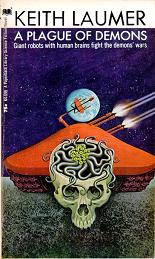
Sharp-eyed readers may have noticed the blog has changed somewhat, having been upgraded from a homebrew of handcoded HTML and an obsolete PHP version of Blosxom to WordPress. All the old links to individual book reviews still work and will keep on working, but this way I can make this into slightly more of a blog and less of just a placeholder.
Meanwhile, in the mail yesterday I reviewed an advance copy of CauseWired, a book version of Tom Watson‘s blog. Watson is an American journalist (not a British member of parliament) who has long been involved in various community and charity orientated web 2.0 and 1.0 ventures. His book is intended as a testimonial to show others how to organise their own causes in a always on, 24/7 internet world with people who’ve never know the world to be anything else.
It was offered through the generosity of Andrew Wheeler, ex-Science Fiction BookClub editor and now some Wiley Publishing bigwig, who earlier this month offered review copies to anybody who “want to read this book before it’s published, and […] have somewhere (preferably online) to talk to people about it afterwards”. I’m in the process of reading it; expect a review this weekend or possibly earlier.



